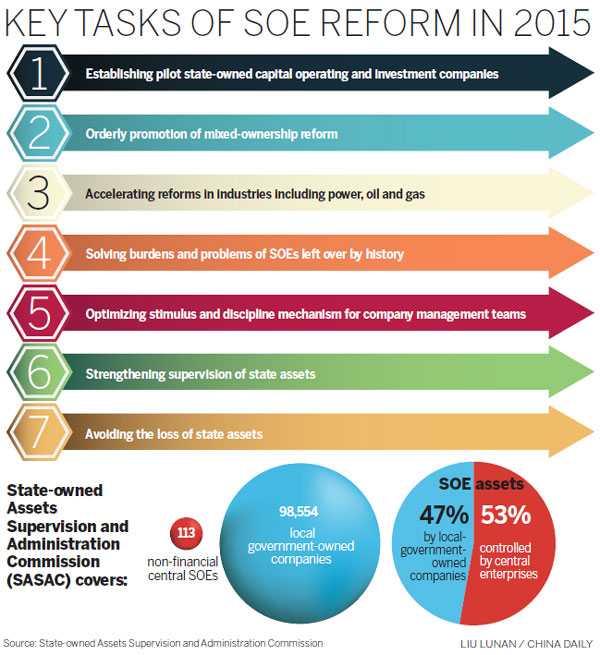SOE reform to open door to foreign capital

Mixed ownership will unlock opportunities for overseas enterprises to enter key industries
China has been pressing ahead with plans to expand mixed ownership of state-owned enterprises to boost economic efficiency. This is expected to produce unprecedented opportunities for foreign companies.
Last year, the government identified two SOEs for reform: China National Building Material Group and China National Pharmaceutical Group Corp.
| People buy fruit at a Beijing Easy Joy store, a retail chain run by the state-owned enterprise Sinopec. Mixed ownership would provide an opportunity for foreign enterprises to enter some industries blocked to private investors. Hu Qingming / China Daily |

In the long run, roughly 50 percent of China's SOEs could be opened for mixed ownership, according to Zhou Fangsheng, deputy director of the China Enterprise Reform and Development Society, a body under the State Council's State-owned Assets Supervision and Administration Commission.
Mixed ownership would mean that large SOEs, which have traditionally held monopolies in many strategic industries, could form joint ventures using private capital.
Zhou says sources of non-state capital include domestic private investors, foreign investors, and SOE employees. He adds that SOEs at both central and local levels offer opportunities for foreign investors.
The commission covers 113 non-financial central SOEs and 98,554 local government-owned companies. Central enterprises controlled about 53 percent of all SOE assets by the end of last year, totalling 91 trillion yuan ($14.63 trillion), according to the Ministry of Finance.
Mixed ownership would provide an opportunity for foreign enterprises to enter some industries blocked to private investors, Zhou says.
"It's possible that foreign capital could become the largest shareholder of an SOE through mixed ownership reform, but don't expect it to become a majority shareholder," he says. "Allowing state capital, non-state capital and employees to each hold one-third of the shares is a suitable proportion for the next step in mixed ownership reform."
Some monopolized industries, such as the electricity sector and railways, or companies closely related to security such as manufacturers of military goods, are not suitable for mixed ownership reform, he says. The planned reform, which was still being finalized, was likely to identify the industries that would qualify. "The degree of openness for domestic private capital will be higher than foreign capital," Zhou adds.
The Third Plenum of the Communist Party of China's 18th Central Committee in November 2013 set the agenda for a new round of SOE reform, and the concept of mixed ownership was strongly endorsed.
In March, Premier Li Keqiang also listed the promotion of mixed ownership as one of the seven tasks to accelerate SOE reform in his annual Government Work Report.
Chinese leaders have vowed to formulate measures for non-state capital to participate in the investment projects of central government enterprises and for non-public enterprises to participate in franchising. However, the pace has been relatively sluggish, according to experts.
China's SOE reform has stagnated during the past decade, while SOEs have been increasingly criticized for their low efficiency.
The productivity gap between state-owned and private companies has widened since the financial crisis in 2008, with an average return on assets for state entities at about 4.6 percent, compared with 9.1 percent for private companies, according to estimates last year by Gavekal Dragonomics, an economic research company in Beijing.
Andrew Batson, the company's China research director, says mixed ownership does not imply an embrace of mass privatization, but adds: "As the economy slows further and financial pressure on local governments increases, privatization should become more acceptable."
Local governments have moved more quickly than central authorities in implementing SOE reform, as they need to find new sources for revenue and lower their liabilities. More than 20 provinces and municipalities have announced local reform plans, including promoting mixed ownership and restructuring state capital.
However, some private business leaders have raised concerns that they would have no influence as board members of mixed ownership firms.
In addition, a policy memorandum from the Paulson Institute, a think tank on China-United States relations, warned that improvements in performance would not automatically follow private investment in China's state-controlled companies.
"The prospects for a mixed ownership economy will ultimately depend on the state's willingness to cede control - not just ownership - of some of the nation's largest enterprises to private interests," the memorandum says.
Analysis posted on the website of Britain's Foreign and Commonwealth Office said local branches of the State-owned Assets Supervision and Administration Commission "have been keen to emphasize to us that they encourage foreign as well as domestic investment" in SOEs.
"For now, genuinely interesting commercial opportunities may be limited," the analysis went on.
"However, reform, if thoroughly implemented, should lead to the opening-up of state-owned monopolies, creating interesting new investment opportunities and a fairer environment for all companies, domestic and foreign, to compete."
lanlan@chinadaily.com.cn
(China Daily European Weekly 07/31/2015 page22)
Today's Top News
- Japan tempting fate if it interferes in the situation of Taiwan Strait
- Stable trade ties benefit China, US
- Experts advocate increasing scope of BRI to include soft power sectors
- New engine powers cargo drone expansion
- China to boost green industry cooperation
- Manufacturing PMI rises in November































